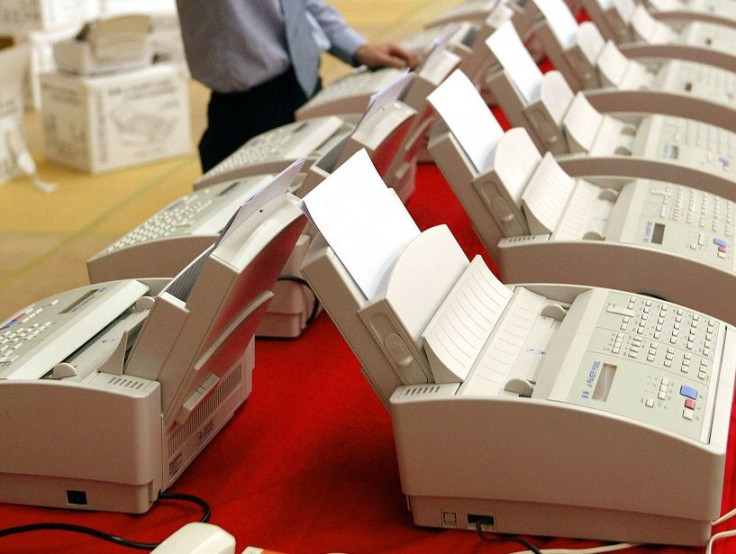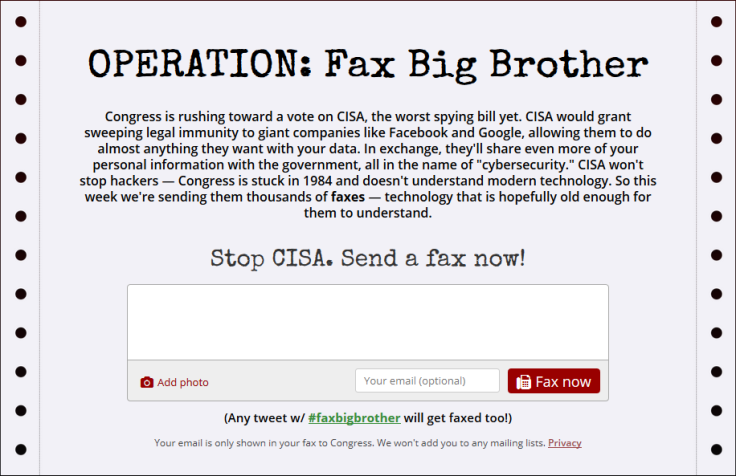CISA 2015: Privacy Groups Wage Fax Warfare To Kill Cybersecurity Bill As Senate Vote Approaches

If you hear a loud rumble coming from Capitol Hill this week, don’t be alarmed. It might just be the sound of 100 fax machines.
In an effort to kill a controversial cybersecurity bill working its way through Congress, privacy groups and civil rights advocates are using 1980s technology to make a point about the folly of ill-conceived legislation, and it might actually be working.
Through a campaign called Operation: Fax Big Brother, petitioners are able to send faxes to all 100 members of the U.S. Senate with the click of a mouse. The purpose? To convince legislators to put the brakes on the Cybersecurity Information Sharing Act, or CISA, which is supposed to encourage better data sharing between technology companies and the government, but which critics say would give the government unprecedented authority to monitor users and violate privacy.
“It’s a regressive piece of legislation,” said Drew Mitnick, policy counsel for Access, an advocacy group that opposes the bill.
So why encourage critics to bombard senators with reams of angry faxes? “We wanted to demonstrate how this is not a modern piece of legislation, just like faxing your members of Congress is like an ancient way of communicating,” Mitnick added.
The Senate was expected to vote on CISA before August recess, but Mitnick and other advocates now say they’re hopeful that the vote will be postponed. Access is holding a press call on Thursday along with other critics of the legislation, including Sen. Ron Wyden, R-Ore.

The Fax Big Brother campaign was spearheaded by Fight for the Future, an Internet advocacy group based in Boston, which set up a website allowing visitors to type their fax into a field and blast faxes to Congress instantly. Users can also send faxes via Twitter by using the hashtag #FaxBigBrother.
Evan Greer, the group’s campaign director, said faxes are coming in faster than the system can send them. As of Wednesday, there were more than 6 million sitting in the queue and about 100,000 faxes actually sent, she said.
“We have eight phone lines running with a dedicated server and modems, and so we’re trying to scale up the number of faxes we can send,” she said. “At this rate, it will take almost a year for all of them to get to Congress.”
CISA, which has bipartisan support, has already passed the Senate Intelligence Committee. The bill was introduced by Sen. Dianne Feinstein, D-Calif., in July 2014 and reintroduced by Sen. Richard Burr, R-N.C., in March 2015. Representatives for the two senators’ offices could not immediately confirm if they had seen an influx of faxes this week.
Either way, the bill has faced widespread criticism from privacy groups, including the Electronic Frontier Foundation. In a blog post this week, EFF activist Nadia Kayyali, called the proposal “fundamentally flawed because of its broad immunity clauses for companies, vague definitions, and aggressive spying powers.”
Mitnick credited the grassroots activism as one of the reasons why the Senate may now postpone the vote. “They’ve been making statements for months about prioritizing this piece of legislation and how critical it is, but it seems like they’ve lost some of their mojo,” he said.
Greer called CISA an “end run” around the privacy protections that enable Internet users to express themselves online without fear of being watched. “Privacy isn’t just about our secrets,” she said. “It’s about our ability to be ourselves and express ourselves freely in the world without feeling like there’s someone constantly watching over our shoulder. This would undermine the Fourth Amendment and prevent us from truly being ourselves on the Internet, which I don’t think is something that anyone wants.”
Christopher Zara is a senior writer who covers media and culture. News tips? Email me. Follow me on Twitter @christopherzara .
© Copyright IBTimes 2024. All rights reserved.






















